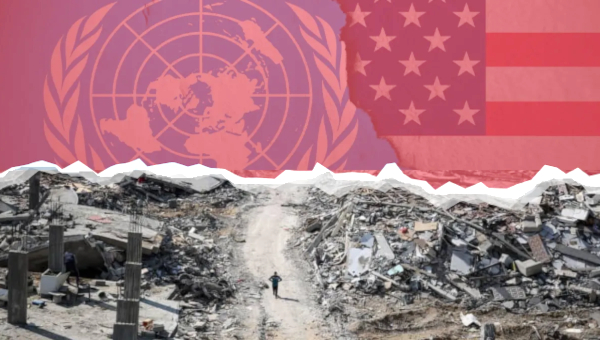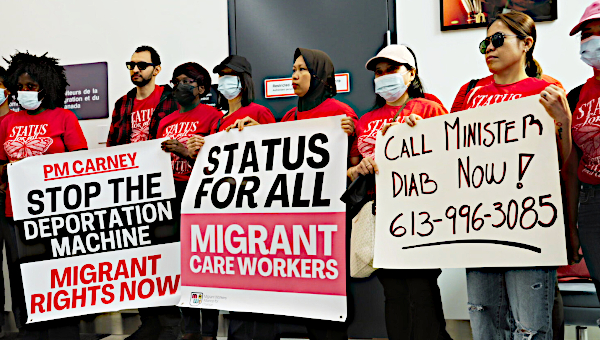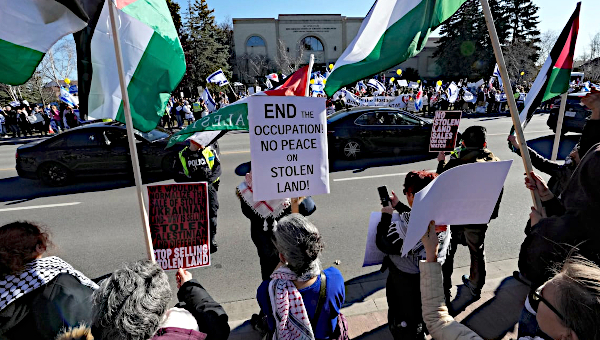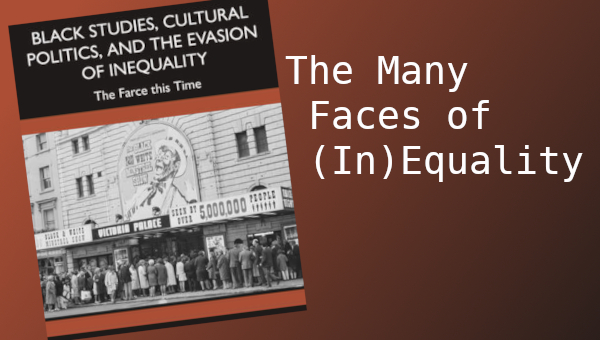Academic Freedoms in Canada and Critical Speech on Palestine and Israel
Context
We are gravely concerned about the widespread suppression of critical speech on Israel and Palestine in the past week not only in Canada, but across much of the West. As scholars whose research is based on questions of antisemitism, colonialism, racism, Islamophobia, queer theory, and related topics, we are concerned that our university administrations are ill-equipped to address the pressures being placed on them by various third parties (including governments, the media, and organizations) to suppress academic freedom.
Threats of funding cuts, personal intimidation tactics, doxing, harassment, and defamation will become severe in the following weeks, possibly months. This is worrying prospect, given that the efforts to censor critical scholarship, are taking place in a climate that has seen the rise of extreme alt-right groups attacking a wide-range of scholarship, including Indigenous Studies, Black Studies, Feminism, Trans Studies, Antisemitism Studies, Middle Eastern Studies, Muslim Studies, Islamophobia Studies, and many other fields. A cautionary tale arising from the violence provoked by these “anti-woke” movements was the stabbing of a gender studies professor and two of her students in a University of Waterloo classroom last June.
As the tensions surrounding violence in Israel and Palestine have become heightened, university communities have begun responding to the crisis in the region. In the past few days, York University has been in the media spotlight for a statement written by three student associations that called for people to support the Palestinian call to end the occupation, using terms like apartheid and settler colonialism. After a barrage of media articles and a pressure campaign, the York Administration released this statement. In addition, after the University of Toronto Vice-President, International put out a statement on October 9, that mostly focused on the violent actions of Hamas in Israel, an open letter signed by 250 faculty, staff, and students (as of October 13) claimed that the statement was one-sided. On October 7, McMaster University issued a statement replying to some social media posts made by representatives of CUPE 3903 who then responded with their own statement. The flurry of responses and contestations to these statements demonstrates the need for concerted action within the university sector to protect academic freedom and the right to dissent.
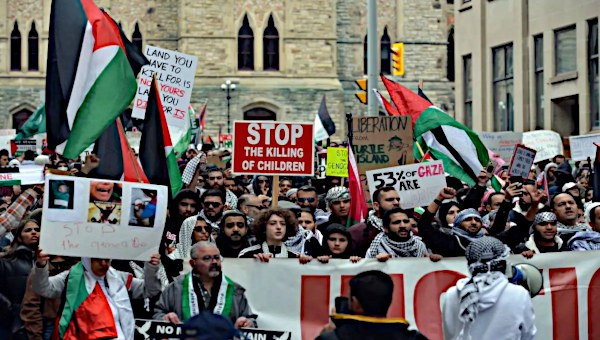
ARC Campaign
In 2019-2020, ARC worked alongside Independent Jewish Voices (IJV), on a national campaign urging universities to reject the controversial International Holocaust Remembrance Association (IHRA) Working Definition of Antisemitism on the grounds that it could be used as a tool to not only censor critical and engaged scholarship but also to undermine anti-racist and decolonization campaigns in our colleges and universities (see our handbook).
The campaign was widely supported across our sector, with 40 faculty associations and academic unions passing motions against the IHRA definition, the Canadian Association of University Teachers (CAUT) national council voted unanimously to oppose the IHRA definition, as did the Ontario Confederation of University Faculty Associations (OCUFA), the Fédération québécoise des professeures et professeurs d’université (FQPPU), La Fédération nationale des enseignantes et des enseignants du Québec (FNEEQ), and the Canadian Union of Public Employees of Ontario (CUPE Ontario).
Despite its widespread and thorough rejection in our sector (to our knowledge no university has adopted the IHRA definition, and it was outright rejected by the University of Toronto after the UT Anti-Semitism Working Group Report (Dec. 8, 2021), our federal government along with many of our regional governments have adopted it in various ways.
The original drafter of the IHRA definition, Kenneth Stern has pointed out that the IHRA definition is ill-suited for legal or administrative purposes and is now being “weaponized” against critics of Israel.
Penalizing those who claim that Israeli policies and practices are racist is categorically antidemocratic and denies Palestinian scholars (and those whose exercise of academic freedom is in solidarity with them) the right to name and defend against state oppression without fear of sanction.
Academic Freedom
Modern universities have been defined and governed as autonomous institutions of learning for a reason. Expectations of institutional autonomy and collegial governance, like that of academic freedom, protect universities from governments or private interests wishing to set limits on what can be researched and what can be taught. When politicians and other political interest groups set the terms for what is legal and admissible in university research and teaching, we are confronted with political intrusion and oversight that undermines academic freedom.
It is our role as intellectuals to provide alternative perspectives of the world. A society that represses critical thought, and a diversity of perspectives, is not a democratic society. It is an authoritarian society.
Documenting threats to Academic Freedom and Critical Scholarship
Scholars supporting the Palestinian struggle for human rights, self determination, and freedom from occupation have long been under siege. These include globally renowned intellectuals such as the Palestinian post-colonial legend Edward Said, celebrated Jewish scholar Judith Butler, Mohawk scholar Audra Simpson, Black feminist author Angela Davis and prominent Cameroonian philosopher Achille Mbembe.
A 2022 study sponsored by Independent Jewish Voices Canada (IJV) examined how the suppression of speech on Palestine has impacted Canadian academic faculty, students, and activists who face reprisals, harassment, and intimidation. The study featured testimonies from 77 participants including 40 faculty members representing eleven disciplines from 21 universities across Canada. These faculty experienced troubling circumstances such as political intervention into hiring; attempts to prevent access to event venues and the attempted cancellation of public events on Palestine as well as targeting and doxing, including the inclusion of 128 Canadian academics and activists on the website of Canary Mission, an organization which purports to document “individuals and organizations that promote hatred of the US, Israel and Jews on North American college campuses.”
According to IJV’s report, “the suppression of speech on Palestine has significant consequences in academia where it threatens principles of academic freedom and encourages surveillance of critical intellectuals and activists and of the oppositional knowledge that they produce.”
Universities must guarantee scholars the freedom to criticize the policies of any state without fear of recrimination such as lawsuits, loss of employment or funding opportunities, harassment, threats, intimidation, and unfounded accusations of bigotry.
Anti-Palestinian Racism
The Arab Canadian Lawyers Association defined anti-Palestinian racism as “a form of anti-Arab racism that silences, excludes, erases, stereotypes, defames or dehumanises Palestinians or their narratives.” Dehumanizing tropes deployed in the current crisis include the characterization of all Palestinians as “human animals,” “monsters,” and “inhuman.”
These harmful stereotypes are similar to equally reprehensible antisemitic narratives that must also be vigorously challenged. We oppose all forms of bigotry and hatred which have no place in our classrooms and campuses.
Anti-Palestinian racism also intersects with Islamophobia and anti-Muslim racism which involve “individual, ideological, and systemic forms of oppression” and discrimination impacting entire global populations.
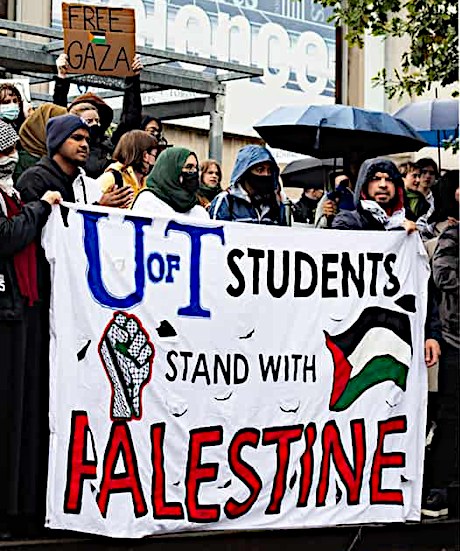
Presently any support for the 75 year long Palestinian struggle for self determination and freedom from occupation has been characterized by politicians and media as “glorifying violence” and supporting terrorism. These false equations rely on vilifying tropes that are common within anti-Palestinian racism and Islamophobic playbooks to silence political dissent, delegitimize decolonial struggles, and demonize entire populations.
The political censure around supporting the decolonial struggles of occupied Palestinians, is a slippery slope that has already led to assaults on scholarly work and public intellectual engagement with these concerns.
In this politically volatile context the need to secure academic freedom and freedom from persecution that can result from one’s academic and political work is imperative especially for racialized scholars who bear the brunt of political vilification and personal and professional attacks.
ACADEMICS COUNTERING DISINFORMATION
As the current crisis has unfolded, we have witnessed the proliferation of fake news and disinformation replace facts and critical analysis. The need for scholarly voices and academic research to counter these trends is paramount. As public intellectuals, scholars have an important role to play in helping the public discern facts from bias and disinformation that can lead to moral panics and violence.
Research has documented the widespread circulation of harmful tropes, scare stories, conspiracy theories, and false reporting in relation to Palestine and Muslims. Similarly, demonizing antisemitic tropes and conspiracies have a long and harmful history. Therefore, in these fraught times, scholarship and teaching that disrupts vilifying stereotypes and brings critical insights and validated academic knowledge to wider public must be safeguarded from outside political pressures, lobbies, and governmental interference.
DECOLONIAL COMMITMENTS IN HIGHER EDUCATION
Universities across the country have made statements that acknowledge and condemn the brutal practices of settler colonialism that were imposed upon Indigenous populations in Canada and have made commitments in support of decolonization as a necessary project of redress and reconciliation. These commitments must extend to all colonized people seeking liberation from violence and oppressive conditions whether in Canada or abroad.
Silencing the ability to name and challenge the racist and colonial endeavours of any state or institution is contradictory not only to the mission of the university but to decolonial knowledge production and institutional adherence to the anti-racism goals that most Canadian universities have publicly committed to upholding.
Universities must reject the censorship of critical and engaged scholarship on Israel and Palestine that effectively serve to undermine the anti-racist and decolonization efforts they claim to support.
MOVING FORWARD
We ask Faculty Associations to pass motions defending their member’s rights to academic freedom and engage in critical scholarship especially in times of war and conflict.
SAMPLE MOTION
[Insert Name] unequivocally supports the academic freedom of its members. This freedom includes the right to pursue research and open inquiry in an honest search for knowledge that is free from institutional censorship, including that of the government.
[Insert Name] acknowledges that the freedom from political and institutional censure is especially critical at times of war and conflict where scholarly voices are an important corrective to widespread disinformation campaigns.
[Insert Name] supports the anti-racist and decolonial initiatives in Canadian educational institutions and opposes anti-Palestinian racism, antisemitism and Islamophobia along with all forms of racism and hatred. We will strive to ensure our members are free from experiencing bigotry and hate in our classrooms and campuses.
[Insert Name] We are committed to protecting the security and safety of all scholars who are targeted because of their scholarship and political work. We call upon our institutions to implement measures to safeguard our members.
[Insert Name] acknowledges that targeted attacks against scholars who support the Palestinian struggle have a chilling effect on the academic freedom of our members in the classroom, in their research, and in campus politics more broadly. These repressive tactics must be challenged, and scholars must be free from all forms of recrimination and harassment that may occur due to the nature of their research.
Action Items
We call on all representatives of academic associations and unions across Canada to immediately undertake the following actions:
1. Executive committees and other association bodies should immediately pass motions reaffirming commitment to protecting academic freedom. Together we must stand against the censorship of critical and engaged scholarship and also efforts to undermine anti-racist and decolonization campaigns in our universities.
2. Make every effort to ensure that your university is releasing statements that reiterate their duty to protect the academic freedom of its scholars as well as the freedom of expression of students. Universities must publicly affirm their commitment to protecting its members from anti-Palestinian racism, antisemitism, and Islamophobia.
Together we must stand strong in the face of neo-McCarthyist calls to censor and silence critical voices in our society. We must act quickly and with one voice to protect our universities.
Please widely distribute your message across your networks to all your colleagues and friends.
ACADEMIC ALLIANCE AGAINST ANTISEMITISM, RACISM, COLONIALISM & CENSORSHIP IN CANADA (ARC)
NATIONAL ARC COORDINATING COMMITTEE MEMBERS
M. Muhannad Ayyash, Associate Professor of Sociology, Mount Royal University
Greg Bird, Associate Professor of Sociology, Wilfrid Laurier University
Larry Haiven, Professor Emeritus, Saint Mary’s University
Sheryl Nestel, Independent Scholar (Independent Jewish Voices)
Jasmin Zine, Professor of Sociology and Religion & Culture, Wilfrid Laurier University
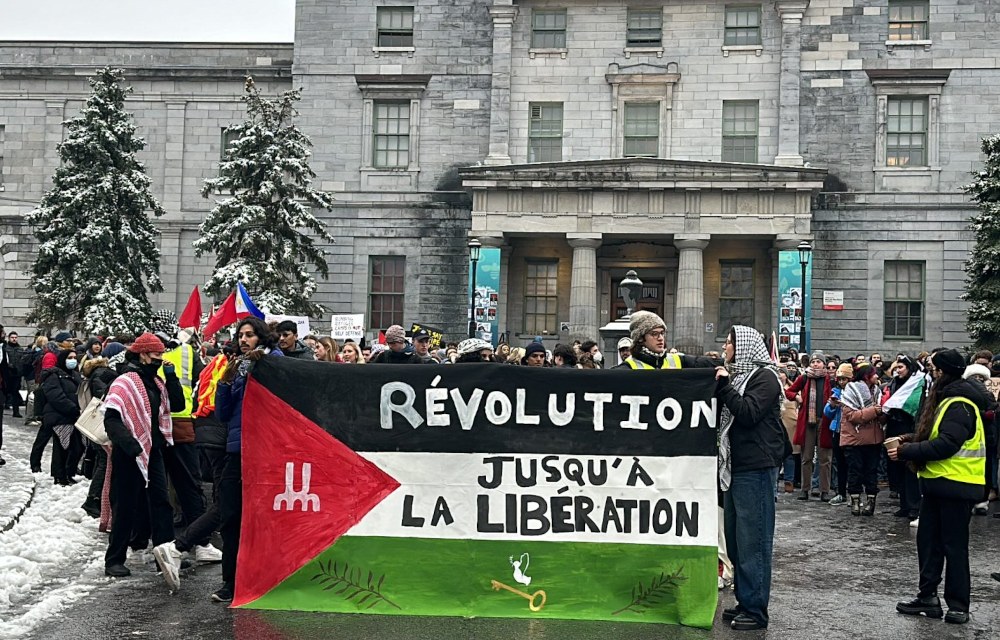
Appendix: Calls to Action in Defence of Academic Freedoms and Critical Scholarship
Complete Motions (Address Academic Freedom plus statement about anti-Palestinian racism, antisemitism, and Islamophobia).
Faculty Associations & Academic Unions:
- Mount Allison Faculty Association
- Wilfrid Laurier University Faculty Association
- Windsor University Faculty Association
- CUPE 3906 (Contract Faculty, Teaching Assistants & Postdocs, McMaster University)
- Syndicat général des professeurs et professeures de l’Université de Montréal
- Ontario College of Art & Design Faculty Association
- Osgood Hall Faculty Association
- CUPE 2626 (Teaching assistants, research assistants, correctors, proctors, lab monitors, lifeguards, and residence life workers at the University of Ottawa).
- University of Saskatchewan Faculty Association
- University of Winnipeg Faculty Association
- CUPE 3903 (Contract Faculty, Teaching/Research Assistants Union, York University)
- Athabasca University Faculty Association (AUFA)
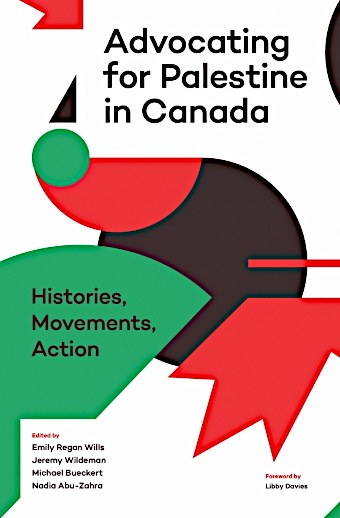
Provincial Confederations:
Partial motions (Only addressing academic freedom but didn’t address anti-Palestinian racism, antisemitism, or Islamophobia):
- York University Faculty Association
- Ontario Confederation of Universities Faculty Associations (OCUFA)
- Canadian Association of University Teachers (CAUT)
Boycott, Divestment & Sanctions:


